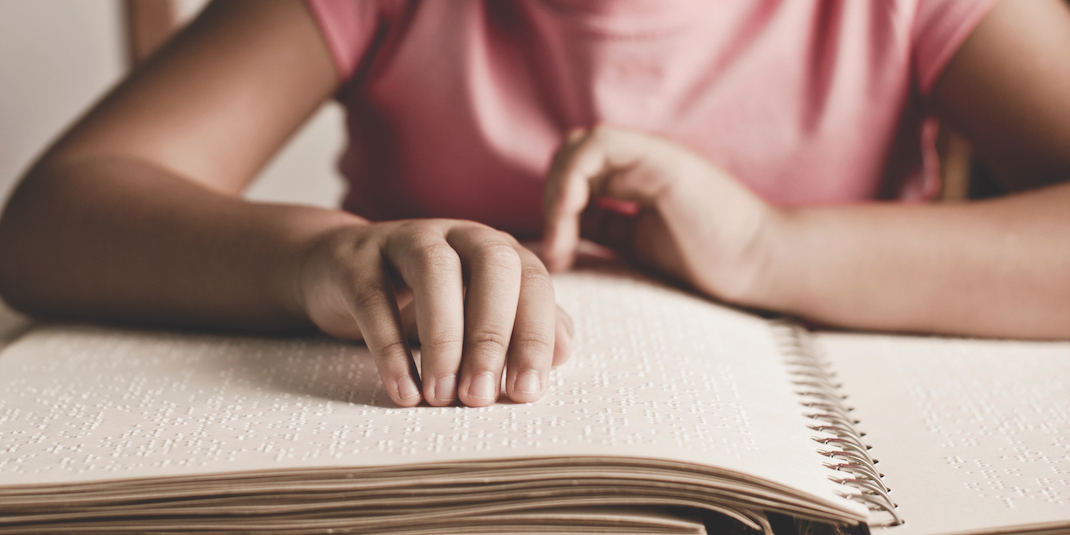MedEd Connections Resource Guide: Blind and Visually Impaired (B/VI)
Literacy

Where Can I Get Braille or Talking Books for my Child, and How Can I Support my Child’s Literacy Skills?
Literacy is key for accessing education and becoming a successful adult. Children who are blind or visually impaired (B/VI) need reading material in a format that is accessible to them. Such formats include large print, braille, audio, and digital text. Text may also be accessed with assistive technology (AT) or low-vision devices. The teacher of students with visual impairments (TVI) will perform a Learning Media Assessment (LMA) to determine how your child can best access text. The LMA will be an ongoing process because the student’s vision and skills may change over time. The TVI and a literacy specialist can work together to provide reading and writing opportunities for your child. It is also important for your child to have books at home in a form easiest for your child to read. The more children read with their family and friends at home and in school, the stronger their literacy foundation will become.
For children with low vision, a Clinical Low Vision Assessment conducted by a Low Vision Specialist, is conducted to verify the child’s visual acuity and visual abilities and find ways to enhance the student’s visual functioning. A low vision evaluation includes the review and evaluation of the learner’s ocular health, visual acuity, visual fields, color vision, refraction and lenses, binocular vision and oculomotor skills, contrast and light sensitivity, and low vision devices. If devices are recommended, they may be provided for a trial period. The teacher of the Visually Impaired (TVI) will work with the learner to instruct them in the use of the recommended low vision devices.
The following are resources related to literacy for people who are B/VI:
- The American Foundation for the Blind - The American Foundation for the Blind introduces braille to families.
- Hadley Institute for the Blind and Visually Impaired - The Hadley Institute for the Blind and Visually Impaired offers an online family education program. Course topics range from blind basics, early childhood, braille, technology, the human eye, and independent living.
- Paths to Literacy - Paths to Literacy provides a braille resource packet for parents of young children.
- Seedlings Braille Books - Seedlings Braille Books provides free or inexpensive braille books for children.
- Cleveland Public Library - The Cleveland Public Library is the Ohio Library for the Blind & Physically Disabled.
- The National Library Service for the Blind and Visually Impaired - The National Library Service for the Blind and Visually Impaired has a free braille and talking book program. To be able to use the program, you must complete an application process, which requires a doctor’s statement of your child’s visual condition. Once eligible, your child can receive free braille or audio books, magazines, and music materials.
- Bookshare - Bookshare offers school-age students free electronic braille, large-print, audio, and online accessible books, periodicals, and magazines. They also include some school textbooks.
- Braille Institute - The Braille Institute offers free braille books for families. Subscribers may order up to 12 books per year.
- American Printing House (APH) - For all kinds of braille texts, games, labelers, and products for school, daily life, and recreation, check out the American Printing House for the Blind.
- Unlocking the English Code - Explore and connect the areas of phonological awareness, phonics, writing, fluency, vocabulary, communication, language, and comprehension specifically for learners who are D/HH or B/VI. To learn more about this topic, and earn professional development credit, log in to your OCALI ID account by clicking here.
Is There any Funding Support for Accessible Educational Materials at School?
Ask your school district to check out the Federal Quota Program, which provides supplemental funds to local school districts to purchase materials for students identified as legally blind. The program is housed in the Assistive Technology and Accessible Educational Materials Center (AT&AEM). The AT&AEM Center is a centralized, responsive resource center that empowers individuals with disabilities by providing accessible educational materials and access to assistive technologies and highly specialized technical assistance and professional development support.